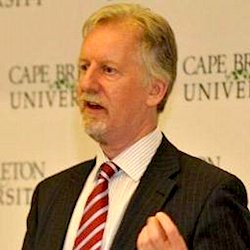03 Aug A far-fetched attack on Wheeler’s fracking review – updated
Andrew Nikiforuk. a respected journalist-critic of the petroleum industry, yesterday attacked David Wheeler, president of Cape Breton University and head of Nova Scotia’s independent fracking review panel, for failing to disclose what he called close ties “to a company that trains oil and gas workers for Exxon Mobil, a key promoter of hydraulic fracturing and one of the world’s largest energy companies.” His critique appeared on TheTyee.ca website.
Although the Nova Scotia Hydraulic Fracturing Review Panel describes David Wheeler as the president and vice-chancellor of Cape Breton University, it makes no mention of his public responsibilities with LearnCorp International. Nor does it disclose that the university owns a firm training workers for Liquified Natural Gas (LNG) terminals…
Critics… contend* that there is a huge difference between being a knowledgeable academic on a subject versus… chairing a company that directly benefits from oil and gas activity in an era of rising concerns about destabilizing climate change.
They argue that the issue is not malfeasance but simple and timely public disclosure of possible conflicts.
You can read Nikiforuk’s argument here, but the gist of his complaint goes as follows:
- As president of CBU, Wheeler automatically serves as chair of the board of LearnCorp International, a school owned by the Cape Breton University Foundation.
- LearnCorp provides training to the oil and gas and mining industries.
- One of its clients is Exxon Mobil.
- Exxon Mobil is promoter of hydraulic fracturing and one of the world’s largest energy companies.
- Some of LearnCorp International’s training for Exxon Mobil has involved Liquified Natural Gas (LNG) facilities.
- The relationship puts Wheeler in a conflict-of-interest that, at a minimum, should have been declared at the outset of the panel’s review.
Well, fine. I’m a big advocate of openness, and Wheeler could have saved himself some silliness by acknowledging his chairmanship of LearnCorp when he took on the panel: Silliness like this headline over a link to the story in Tim Bousquet’s Halifax Examiner: “Where Thieves and Pimps Run Free” [paywall]. [UPDATE: Tim Bousquet writes to say that headline did not refer to Wheeler or The Tyee, and I accept that, but wonder if others may have shared my confusion. In any case, happy to clear that up.]
My guess is it didn’t occur to him. The position is ex-officio; he assumed it automatically when he became president of CBU. It is unpaid. The chairmanship is “non-executive,” which is to say, Wheeler has no role in the day-to-day operations of the LearnCorp. The company is a non-profit. It has many clients, to whom it provides training in a variety of areas, including health & safety, environmental management, governance, stakeholder engagement, and sustainability. It doesn’t teach fracking.
 In addition to acknowledging Wheeler’s tenuous connection to Exxon Mobil’s LNG operations, the panel probably should have noted his past work for various UN agencies and such environmental groups as Greenpeace International, the Sierra Club, the Pembina Institute, and Pollution Probe, omissions that don’t seem to have troubled The Tyee or Nikiforuk.
In addition to acknowledging Wheeler’s tenuous connection to Exxon Mobil’s LNG operations, the panel probably should have noted his past work for various UN agencies and such environmental groups as Greenpeace International, the Sierra Club, the Pembina Institute, and Pollution Probe, omissions that don’t seem to have troubled The Tyee or Nikiforuk.
The irony of Nikiforuk’s attack on Wheeler as an industry foil is that he is usually considered one of the province’s most prominent and respected environmentalists—so much so that oil and gas industry officials greeted his appointment to head panel with dismay.
Wheeler wisely chose panel members with a wide range of backgrounds, views, and professional experience. Because of this, it has been able to take a thorough and balanced approach to assessing the evidence about fracking, one in which all views and all topics were thoroughly aired.
Think how unusual this is. For the most part, available information about fracking is the product of people with their minds irrevocably made up—whether industry propagandists or anti-fracking zealots. Finding balanced, dispassionate information that weighs the evidence fairly has been next to impossible. Wheeler and his panel have gone a long way toward filling that gap. On the panel’s website, you can find a wealth of material, all of which was released in draft format for comment before the panel produces its final report.
Wheeler has signalled that the report, due out this month, will recommend against allowing fracking any time soon—or ever without the consent of communities where it will take place. He will recommend more study, with a particular eye on New Brunswick, which is pressing ahead with the technology despite furious objections from some residents.
This isn’t enough for anti-fracking zealots, who will accept nothing less than ringing denunciation of fracking as the work of Satan. Wheeler’s failure to comply has produced much indignant shouting during his recent pre-report round of public meetings, to which he responded with polite aplomb and exemplary calm.
The public owes Wheeler a debt of gratitude for taking on this thankless chore. In the end, I suspect the Liberal government will be happy to punt, and wait to see how New Brunswick, with its similar geology, gets along with fracking.
You can read my debate with Nikiforuk in The Tyee’s comment section, a statement Wheeler issued (and The Tyee failed to publish) in response to its story, and his elaboration in an interview with the Chronicle-Herald’s able Cape Breton bureau chief, Tom Ayers.
—
* Note Nikiforuk’s classic use of the phrase “critics contend,” a journalistic device for saying, “what I think is…,” without openly shedding the fig leaf of objectivity.
